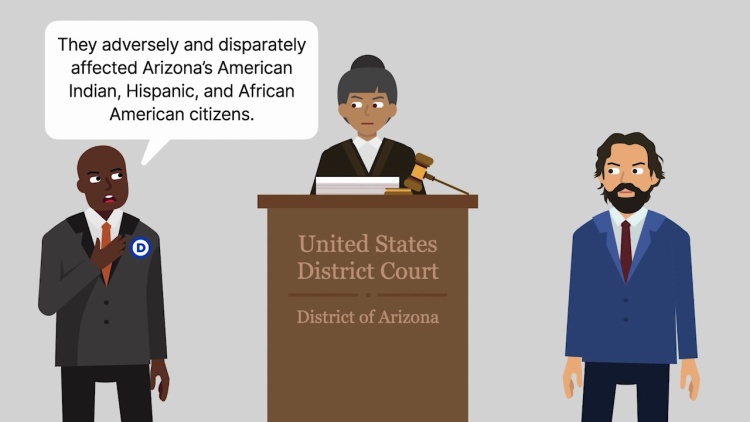Brnovich v. Democratic National Committee
United States Supreme Court
141 S.Ct. 2321 (2021)
- Written by Tanya Munson, JD
Facts
Arizona voting laws permitted residents to vote by mail for 27 days before an election using an early ballot. Residents were also permitted to vote in person at an early-voting location or in person on election day. Counties could conduct election-day voting by using the traditional precinct model. Voters who chose to vote in person on election day in a county that used the precinct voting system had to vote in their assigned precinct. To prevent overcrowding of voting centers or a shortage of ballots, Arizona required that if a voter cast a ballot in the wrong precinct, the vote was not counted. To prevent mail-in voting fraud, in 2016 the Arizona state legislature enacted House Bill 2023 (HB 2023), which made it a crime for any person other than a postal worker, an elections official, or a voter’s caregiver, family member, or household member to knowingly collect an early ballot. The Democratic National Committee (DNC) (plaintiff) brought suit in district court challenging the state’s refusal to count ballots cast in the wrong precinct and HB 2023 (the voting laws). The DNC argued that the voting laws adversely and disparately affected Arizona’s minority citizens in violation of § 2 of the Voting Rights Act (VRA). The district court rejected the DNC’s claims. The DNC appealed, and the court of appeals reversed, finding both laws violated § 2 of the VRA.
Rule of Law
Issue
Holding and Reasoning (Alito, J.)
Concurrence (Gorsuch, J.)
Dissent (Kagan, J.)
What to do next…
Here's why 905,000 law students have relied on our case briefs:
- Written by law professors and practitioners, not other law students. 47,100 briefs, keyed to 995 casebooks. Top-notch customer support.
- The right amount of information, includes the facts, issues, rule of law, holding and reasoning, and any concurrences and dissents.
- Access in your classes, works on your mobile and tablet. Massive library of related video lessons and high quality multiple-choice questions.
- Easy to use, uniform format for every case brief. Written in plain English, not in legalese. Our briefs summarize and simplify; they don’t just repeat the court’s language.





